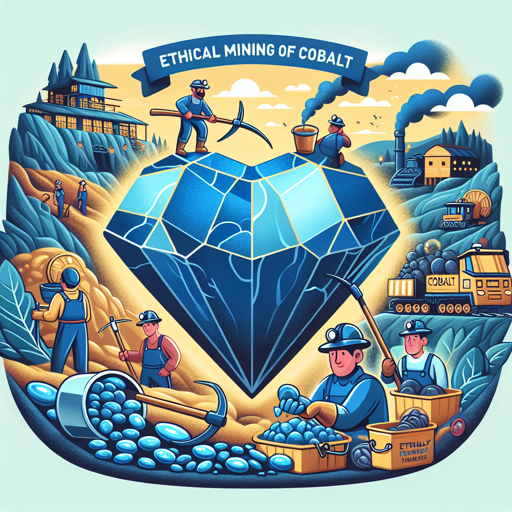Ethical Challenges in Cobalt Mining
Exploring the Complexities of Ethically Mining Cobalt, a Crucial Mineral

Introduction
In the heart of Earth’s crust, beneath the surface where we live and breathe, lies a world of precious minerals and resources. One such mineral, cobalt, is a critical component in the electronics we use daily, from smartphones to electric vehicles. However, the extraction of this seemingly indispensable mineral begs the question of ethics, with numerous social and environmental challenges emerging from cobalt mining activities.
The Cobalt Conundrum
Cobalt’s significance stems from its unique properties. It’s not only resistant to high temperatures but also maintains its strength under extreme conditions, making it perfect for rechargeable batteries. Yet, this demand comes with significant ethical concerns.
Environmental Impact
Cobalt mining has considerable environmental implications. Acid mine drainage, a process where sulfide minerals are exposed to air and water, producing sulfuric acid, is a major concern in cobalt mines. This can lead to the contamination of nearby water sources, posing serious health risks to local communities.
| Impact | Description |
|---|---|
| Soil Degradation | Mining activities lead to soil degradation, affecting local agriculture and flora. |
| Water Pollution | Acid mine drainage contaminates water bodies, affecting both human and aquatic life. |
| Air Pollution | Dust and emissions from mining operations pollute the air, contributing to climate change. |
Social Impact
In addition to the environmental damage, cobalt mining often involves severe human rights violations. Child labor, hazardous working conditions, and exploitation are tragically common in areas rich in cobalt, particularly in the Democratic Republic of Congo (DRC), which accounts for over 60% of global cobalt production.
“Mining can be an engine for socio-economic growth, but without proper regulations and safeguards, it may lead to environmental degradation and social inequality.” - Dr. Jane Goodall
Ethical Mining Practices
Contrary to the grim picture painted above, all hope is not lost. Ethical mining practices are being implemented to tackle the issues mentioned. These include the use of renewable energy in mining operations, efficient water management, workers’ rights protection, and community engagement.
For instance, Fairphone, a smartphone company, sources its cobalt from artisanal mines in the DRC that are committed to improving working conditions and eradicating child labor.
Conclusion
The ethical mining of cobalt is a complex issue that requires concerted efforts from governments, mining companies, and consumers. While the path is fraught with challenges, the potential for change is immense. As we delve deeper into the age of technology, it is crucial to remember the hidden cost of the minerals that power our devices and strive to make the mining process as ethical as possible.